You are using an out of date browser. It may not display this or other websites correctly.
You should upgrade or use an alternative browser.
You should upgrade or use an alternative browser.
Felicity Jones
- Thread starter Cellardoor
- Start date
HeatherAnne
Well-Known Member
- Joined
- Jan 24, 2008
- Messages
- 24,230
- Reaction score
- 994
Why do stylists turn her into tcaricature of herself. First Leith Clark had to style her super feminine/girly nauseating looks -- now this stylist is on the other end of the spectrum, constantly putting her in these mature/politician outfits. She's gorgeous, she's young, damn, I just want to see her wear something a 35 year old would want to wear.
Yohji
Well-Known Member
- Joined
- Mar 12, 2015
- Messages
- 11,344
- Reaction score
- 3,429
At LAX Airport on November 6, 2018.


Felicity Jones at the 'On the Basis of Sex' press conference at the Four Seasons Hotel on November 5, 2018 in Beverly Hills, California.


Felicity Jones presents onstage at the Hamilton Behind the Camera Awards presented by Los Angeles Confidential Magazine on November 4, 2018 in Los Angeles, California.



In New York on July 20, 2018.

bellazon.com


Felicity Jones at the 'On the Basis of Sex' press conference at the Four Seasons Hotel on November 5, 2018 in Beverly Hills, California.


Felicity Jones presents onstage at the Hamilton Behind the Camera Awards presented by Los Angeles Confidential Magazine on November 4, 2018 in Los Angeles, California.



In New York on July 20, 2018.

bellazon.com
Yohji
Well-Known Member
- Joined
- Mar 12, 2015
- Messages
- 11,344
- Reaction score
- 3,429
Her new stylist: rebecca grice (@thegriceisright) • Instagram photos and videos
She needs to stop changing her stylist and just just go back to Jessica Paster who style her during the Like Crazy-era.
She needs to stop changing her stylist and just just go back to Jessica Paster who style her during the Like Crazy-era.
Actress Felicity Jones attends SAG-AFTRA Foundation Conversations screening of 'On the Basis of Sex' at SAG-AFTRA Foundation Screening Room on November 9, 2018 in Los Angeles, California.

Actress Felicity Jones attends the SFFILM Presents 3rd Annual SF Honors Award at Castro Theater on November 10, 2018 in San Francisco, California.

Actress Felicity Jones speaks onstage at AFI FEST 2018 Presented by Audi - Indie Contenders at The Hollywood Roosevelt Hotel on November 11, 2018 in Los Angeles, California.


dailymail.co.uk, zimbio.com

Actress Felicity Jones attends the SFFILM Presents 3rd Annual SF Honors Award at Castro Theater on November 10, 2018 in San Francisco, California.

Actress Felicity Jones speaks onstage at AFI FEST 2018 Presented by Audi - Indie Contenders at The Hollywood Roosevelt Hotel on November 11, 2018 in Los Angeles, California.


dailymail.co.uk, zimbio.com
Yohji
Well-Known Member
- Joined
- Mar 12, 2015
- Messages
- 11,344
- Reaction score
- 3,429
Felicity Jones attends BAFTA Los Angeles Reception with Felicity Jones at the British Consul General's residence on November 15, 2018 in Los Angeles, California.


zimbio.com





ateliermanagement.com
http://smagazineofficial.com/trending/meet-our-winter-cover-star-felicity-jones-111313758


zimbio.com





ateliermanagement.com
http://smagazineofficial.com/trending/meet-our-winter-cover-star-felicity-jones-111313758
Yohji
Well-Known Member
- Joined
- Mar 12, 2015
- Messages
- 11,344
- Reaction score
- 3,429
Felicity Jones attends the Academy of Motion Picture Arts and Sciences' 10th annual Governors Awards at The Ray Dolby Ballroom at Hollywood & Highland Center on November 18, 2018 in Hollywood, California.


zimbio.com


zimbio.com
Nymphaea
Well-Known Member
- Joined
- Oct 30, 2012
- Messages
- 6,196
- Reaction score
- 695
Porter Edit by Net-A-Porter
December 7, 2018
The Illusionist
Model Felicity Jones
Photographer Matthew Sprout
Styling Tracy Taylor
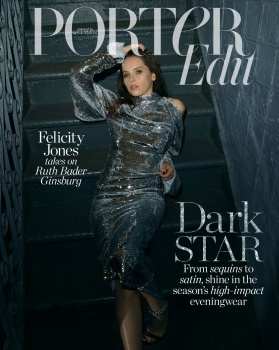

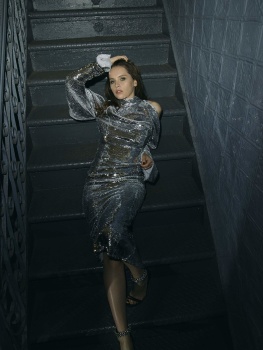
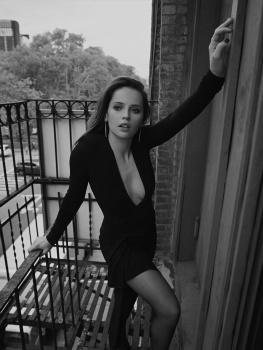
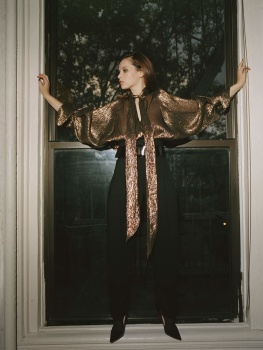
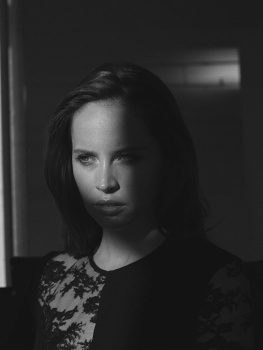
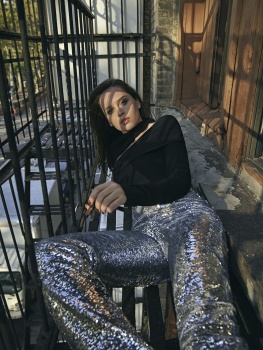
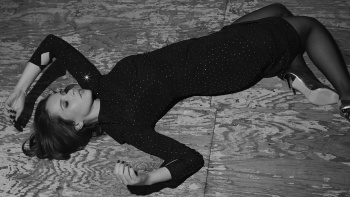
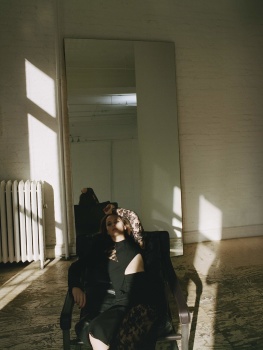
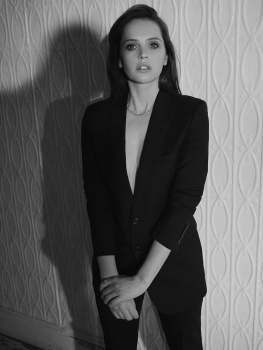
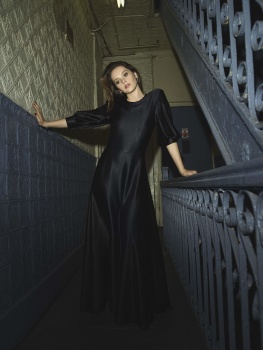
December 7, 2018
The Illusionist
Model Felicity Jones
Photographer Matthew Sprout
Styling Tracy Taylor











net-a-porterSuperhero blockbusters, indie rom-coms, real-life biopics, Star Wars – is there any role that FELICITY JONES can’t master? As she takes on the indomitable Ruth Bader Ginsburg in On the Basis of Sex, the Oscar-nominated actress talks heroic women and doing her own stunts with JANE MULKERRINS.
There’s a teenage girl loitering near our table, trying to attract our attention, while simultaneously trying to look like she’s not. When I mention this to Felicity Jones, who has her back to the room, there’s not a second’s hesitation before the actress is up and out of her seat, warmly greeting the star-struck teen and offering to pose for a picture with her. “Star Wars definitely shifted things,” Jones says of her public profile, when – her young fan delirious and dispatched – she sits back down. The 35-year-old Brit played the heroine Jyn Erso in Rogue One: A Star Wars Story, the most-recent-but-one film in the mega-franchise. “I never set out to be famous; it’s been a by-product of doing something that I love,” she continues, cheerfully. “I want to put relevant and entertaining stories out into the world, but this is the other side of it. And I think you just have to enjoy it – you can’t turn around and start complaining.”
Perhaps not, but it isn’t every Oscar-nominated actress (she was given the nod for her role as Jane Hawking in 2014’s The Theory of Everything) who displays such grace and generosity first thing in the morning, especially while wearing no makeup and sporting what New York’s ultra-groomed women generally think of as ‘British hair’. But dispensing with the fripperies of female image management feels wholly appropriate this morning. We’re having coffee in New York’s Crosby Street Hotel and Jones, in denim dungarees and a Burberry trench coat (she was, for a time, a face of the brand), is discussing her latest role, that of Ruth Bader Ginsburg in the forthcoming biopic, On the Basis of Sex. The 85-year-old Supreme Court Justice, dubbed the ‘Notorious RBG’, has spent much of her life and legal career fighting for gender equality and women’s rights in the United States, where she remains the voice of progressiveness in a Supreme Court rapidly becoming more conservative.
Though the film is a period piece, covering RBG’s challenges and triumphs from the 1950s to the early 1970s, its subject matter could not feel more timely, notes Jones: “We were filming it in the midst of the beginning of the #MeToo movement, and since then, with everything that’s happened with the Supreme Court, her story feels even more pertinent.” The actress spent time with Ginsburg at her home in Washington D.C., where she lived with her husband of 56 years, Martin (‘Marty’) Ginsburg, who died in 2010. “It’s incredibly moving when you meet the Justice, because of everything that she’s achieved,” says Jones. “There was no path set out for her. She was doing it all on her own at a time when it was really, really difficult.” When she attended the prestigious Harvard Law School as a postgraduate, Ginsburg was one of just nine women in a class of around 500 men. “She was constantly the underdog, and had to not only be good, but even better [than the men],” says Jones. “She was so career-focused but rejected from jobs because of her [Jewish] religion and her gender.”
While the film documents Ginsburg’s path to the highest legal appointment in the land, a path beset by sexism and misogyny, it is also a portrait of her very modern marriage to fellow lawyer Marty, played in the film by Armie Hammer, who supported his wife’s career unreservedly. Marty did all the cooking at home, says Jones: “They believed that gender stereotypes limit both men and women, that the patriarchy holds everyone back.” The apartment, she says, remains full of “the remnants of their life together – including racks of Marty’s cooking pots”. Now, Jones does not take her own opportunities for granted. “You’re not just expected to settle down and have children,” she notes. “If you want to do that, then that’s equally as valid a choice. But if you have ambition, why not follow it?”
Born and raised in Bournville, in the UK’s West Midlands, Jones joined a local drama group aged 10, though not initially with any real ambition to act. “I was really shy and my parents thought it would be a good way to socialize and come out of myself a bit,” she explains. “But it was very much a hobby. I wasn’t Judy Garland.” Her father was a journalist who worked, for a time, for the British TV current affairs program The Cook Report, and is now a business consultant, while her mother worked in advertising. “Going to school and doing your homework were big priorities in our house.” Her parents divorced when she was three years old. “My mother put a huge emphasis on economic independence, because she knew when you have that, you have freedom, so that has always been a huge thing for me,” she says. “I feel as though it’s implicit with bringing up sons and hopefully, for the next generation, it will be with daughters, too.”
Jones had a taste of her own economic independence early, when she landed the role of Emma Carter on the BBC Radio 4 agricultural soap and national institution The Archers at 15. “I remember going out and buying Alanis Morissette’s album Jagged Little Pill with my wages and thinking, ‘This is it – freedom, wow.’” She continued recording the role throughout her three years studying English at Oxford University, where, she says, her experiences were in direct contrast to those of RBG in her Harvard days. “I felt like there was an absolute balance, it wasn’t a macho atmosphere at all,” says Jones, who confesses to having spent many nights as a student traveling to drum and bass nights in London. “We’d go to [the club] Fabric all night, and get the bus back to Oxford at about 5am,” she recalls, fondly.
A marriage of minds is very much apparent in the film’s depiction of the Ginsburg union, and Jones’ own looks to be similar. This June, she married 46-year-old director Charles Guard. They first met, she tells me, “in an elevator in LA. A proper Hollywood love story for two Brits,” she laughs. Guard was out there working on a series of adverts, while Jones was on the press tour for The Theory of Everything. “I would keep bumping into him at the Sunset Tower Hotel,” she recalls. “I’d go away and come back two weeks later and he’d still be there. Eventually, we got chatting.” For their wedding this summer, at Sudeley Castle in the British Cotswolds – attended by her former co-stars Eddie Redmayne and Tom Hanks (who worked with her on the Dan Brown adaptation Inferno) – Jones displayed that uncommonly un-A-list behavior again by doing her own hair and makeup. “I’m a real hippy deep down,” she laughs. “And I guess I’m just not a very girly-girl.”
She’s recently been reunited with Redmayne for The Aeronauts, out later next year, in which she plays the 19th-century balloonist Amelia Wren. “I thought it was going to be a very safe period drama, then it turned into a Victorian version of The Revenant,” she laughs. The stunt sequences, which Jones and Redmayne performed themselves, involved hot air balloons and all manner of aerial acrobatics. “I loved it,” she enthuses. “I’d be hanging off the basket and everyone would be asking if I was okay, and I’d be like, ‘This is a dream for me. This is what I’ve wanted to do my entire life – a bit of rough and tumble.’”
Ruth Bader Ginsburg famously said of courts and their decisions that “[they] should never be affected by the weather of the day, but inevitably, they will be affected by the climate of the era”. Is Jones more conscious now of contributing to the ‘climate of the era’ with her roles? “When you start out, you’re just trying to pay the rent, so you’re taking whatever comes along,” she nods. “But in the last few years, I’ve felt particularly inspired by people like Reese Witherspoon producing Big Little Lies, which shifted the cultural landscape. In many ways, I believe it allowed the #MeToo movement to have such a hold.” (The miniseries explored r*pe, domestic violence, and the collective power of women.) “We actors are circus performers, we’re carnival folk,” she smiles. “But we can do it with a sense of what is relevant. Storytelling can shift collective consciousness.”
On the Basis of Sex is out Dec 25 (US); Feb 8 (UK)
HeatherAnne
Well-Known Member
- Joined
- Jan 24, 2008
- Messages
- 24,230
- Reaction score
- 994
Sexy looks suit her, glad Porter recognizes that, sine her stylists make her sexless.
kissmesweet
Well-Known Member
- Joined
- Dec 26, 2005
- Messages
- 19,675
- Reaction score
- 338
Hear, hear!Sexy looks suit her, glad Porter recognizes that, sine her stylists make her sexless.
Similar Threads
- Replies
- 25
- Views
- 8K
Users who are viewing this thread
Total: 1 (members: 0, guests: 1)
New Posts
-
-
-
Vogue Czechoslovakia January 2026 : Hana Janata by Ina Levy & Taylor Hill by Jesus Isnard (7 Viewers)
- Latest: jeremydante
-
-























